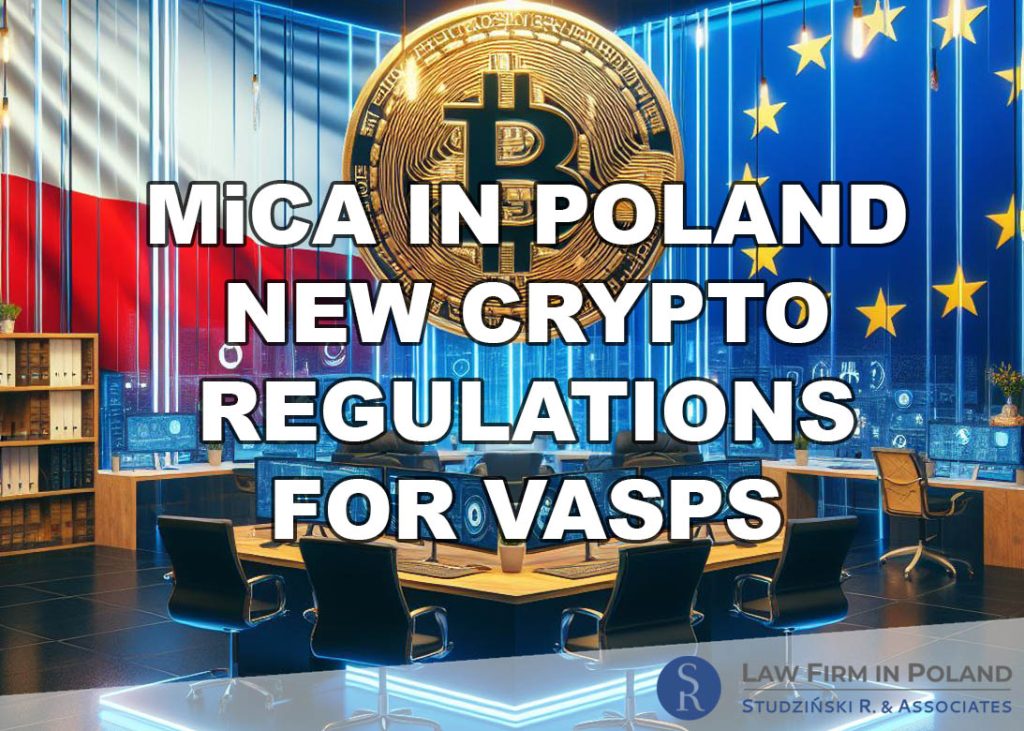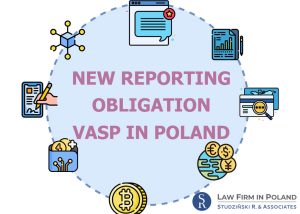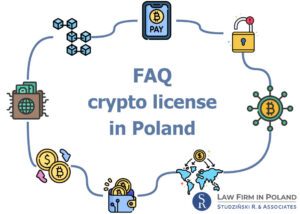The draft of new Polish regulation on crypto-assets has been submitted for public consultation. New law is a result of the adoption by the European Parliament and the Council (EU) of Regulation 2023/1113 of 31 May 2023 on accompanying information for transfers of funds and certain crypt-assets and amending Directive (EU) 2015/849, as well as Regulation 2023/1114 of 31 May 2023 on cryptoasset markets, commonly referred to as the MiCA.
Status of current VASPs and Polish VASP Register
- Current Polish VASP Register will cease to exist as of 1st January 2026.
- Present regulation in scope of entry into Polish VASP Register will be valid until 30th December 2024. Therefore Polish companies may apply for entry into Polish Cryptocurrencies Register until end of the year.
- As of 1st January 2025 Polish companies will have to obtain cryptocurrency license in Poland according to Article 59 of the Regulation (EU) 2023/1114.
- Polish companies entered into VASP Register will be entitle to conduct crypto-asset business activity until end of 2025.
- The question arises as to the situation of entities already registered under the current VASP registry which will apply for a license under the new law but whose application will not be processed by December 30, 2025. It appears that the provisions of the new law do not address this specific issue:
During the period from the entry into force of this law until the issuance of the permit referred to in Article 59(1)(a) of Regulation 2023/1114, or the refusal to grant such permit, but no later than December 31, 2025, an entity registered as of the entry into force of this law in the register of virtual currency activity, providing services in the field of cryptoassets as defined in Article 3(1)(16) of Regulation 2023/1114, shall conduct virtual currency activities in accordance with the provisions of the law as amended in Article 101 in its previous wording.
Strict interpretation of this provision implies that such entities, after 2025, will not be able to provide services in the field of virtual currencies until they obtain a new crypto license in Poland.
Obtaining Crypto License in Poland as of 1st January 2025
According to new Polish Crypto-Asset Act, obtaining authorization to provide services in the scope of virtual currencies will be far more formalized that current one. At the beginning of new year obtaining crypto license in Poland will be subject to regime of Regulation (EU) 2023/1114 and Regulation (EU) 2023/1113. Several new requirements will have to be fulfilled by Polish company applying for crypto-asset service provider license in Poland.
To obtain Polish crypto license under new rules applicant will have to prepare:
- a programme of operations, setting out the types of crypto-asset services that the applicant crypto-asset service provider intends to provide, including where and how those services are to be marketed;
- proof that the applicant crypto-asset service provider meets the requirements for prudential safeguards set out in Article 67;
- a description of the applicant crypto-asset service provider’s governance arrangements;
- proof that members of the management body of the applicant crypto-asset service provider are of sufficiently good repute and possess the appropriate knowledge, skills and experience to manage that provider;
- the identity of any shareholders and members, whether direct or indirect, that have qualifying holdings in the applicant crypto-asset service provider and the amounts of those holdings, as well as proof that those persons are of sufficiently good repute;
- description of the applicant crypto-asset service provider’s internal control mechanisms, policies and procedures to identify, assess and manage risks, including money laundering and terrorist financing risks, and business continuity plan;
- the technical documentation of the ICT systems and security arrangements, and a description thereof in non-technical language;
- a description of the procedure for the segregation of clients’ crypto-assets and funds;
- a description of the applicant crypto-asset service provider’s complaints-handling procedures;
- where the applicant crypto-asset service provider intends to provide custody and administration of crypto-assets on behalf of clients, a description of the custody and administration policy;
- where the applicant crypto-asset service provider intends to operate a trading platform for crypto-assets, a description of the operating rules of the trading platform and of the procedure and system to detect market abuse;
- where the applicant crypto-asset service provider intends to exchange crypto-assets for funds or other crypto-assets, a description of the commercial policy, which shall be non-discriminatory, governing the relationship with clients as well as a description of the methodology for determining the price of the crypto-assets that the applicant crypto-asset service provider proposes to exchange for funds or other crypto-assets;
- where the applicant crypto-asset service provider intends to execute orders for crypto-assets on behalf of clients, a description of the execution policy;
- where the applicant crypto-asset service provider intends to provide advice on crypto-assets or portfolio management of crypto-assets, proof that the natural persons giving advice on behalf of the applicant crypto-asset service provider or managing portfolios on behalf of the applicant crypto-asset service provider have the necessary knowledge and expertise to fulfil their obligations;
- where the applicant crypto-asset service provider intends to provide transfer services for crypto-assets on behalf of clients, information on the manner in which such transfer services will be provided;
- the type of crypto-asset to which the crypto-asset service relates.
Share capital requirements
As, it was outlined before, new Polish Crypto-active Act imposes prudential safeguard requirement. Among others, it means that Polish VASPs will have to meet minimum capital requirements:
Minimum Capital Requirements For Crypto-Asset Service Providers
Crypto-asset service providers | Type of crypto-asset services | Minimum capital requirements under Article 67(1), point (a) |
Class 1 | Crypto-asset service provider authorised for the following crypto-asset services: | EUR 50 000 |
Class 2 | Crypto-asset service provider authorised for any crypto-asset services under class 1 and: | EUR 125 000 |
Class 3 | Crypto-asset service provider authorised for any crypto-asset services under class 2 and: | EUR 150 000 |
Supervisory, administrative penalties and criminal sanctions
First of all, new crypto-asset act designates the Polish Financial Supervision Authority (KNF) as the competent authority for the implementation of Regulation 2023/1114 and introducing tools to effectively supervise and enforce new regulation. In case of violations of the provisions of Regulation 2023/1114, delegated acts, or implementing acts, new act grants the KNF supervisory measures to prevent infringements by Polish VASPs. KNF will be also granted possibility to impose administrative sanctions on Polish crypto-assets service providers.
New act introduces also criminal liability for supervised entities. The severity of penal measures will depend on the degree of misconduct and will be closely related to the type of criminalized act (this solution aims to ensure the safety of crypto-asset trading, primarily protecting clients, safeguarding the state, and investors).






Dear Team,
We are intrested in onboarding Polish VASP with new MiCA regulations. Have Polish regulations been already adopted? Is there road map to obtain new crypto license in Poland?
With regards
Hello John, hope you are well!
Unfortunately, new Polish Act on Crypto Assets is still at the stage of public consultations. Therefore, requirements for obtaining crypto license (CASP license) under MiCA are described in the article. Regarding approach, process and general know how about new crypto licensing in Poland – we have to still wait.